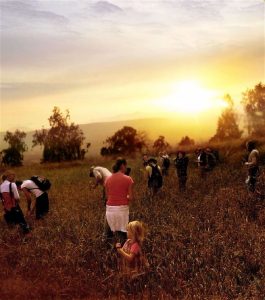What are the Jewish holidays all about? The old joke has it this way: “They tried to destroy us; they failed; let’s eat.” Hanukah, Purim, and Passover fit this description perfectly well: they—the idolatrous Greeks, Haman, and Pharaoh with his army—did try to destroy us, each in their own time, place, and way. And fail they did as well, thank God, giving us wonderful occasions to commemorate God’s victories over his people’s enemies and our continued survival. The old joke also got it right about eating—food is an important
victories over his people’s enemies and our continued survival. The old joke also got it right about eating—food is an important
element in all celebrations, so why should Jewish ones be an exception? Still, some of the holidays have a different story behind them, and Shavuot (the Hebrew name for Pentecost) is a case in point. So what’s the story of this feast, or, as they say, “the reason for the season”?
Turning to the Torah, we find the commandment to celebrate the “Feast of Weeks,” but no particular story attached to it. Leviticus 23:15–21 simply commands the Israelites to count 50 days “from the day that you bro
ught the sheaf of the wave offering” and then to “offer a new grain offering to the Lord.” That offering was special: “You shall bring from your dwellings two wave loaves of two-tenths of an ephah. They shall be of fine flour; they shall be baked with leaven. They are the firstfruits to the Lord.”
The origin of Pentecost is, thus, purely agricultural: it was the feast of the first fruits, which are important in two ways. First, all fruit is the result of hard labor coupled with prayer for God’s blessing, and as such brings nurturing, satisfaction, and joy. Second, the first fruits were especially significant as a promise of the future harvest—sort of a down payment. Having reaped the first fruit, the farmer knew that more was to come—the fullness of the harvest, to be gathered in during the fall. And the Feast of Tabernacles, which is celebrated in the fall, is actually the feast of the final harvest. Together with Passover and the Feast of Tabernacles, Shavuot is one of the “shalosh regalim”—the three yearly pilgrimage feasts for which all Israeli men were commanded to go up to Jerusalem and worship at the temple.
By the times of Jesus, the tradition had been in existence for centuries, but that Day of Pentecost was unique. The very same Spirit that previously rested only on priests, kings, and prophets was now given  to simple people—men and women, young and old. Their only distinction from the rest of Israel was their faith in Jesus the Messiah. They saw him not only crucified, but also raised immortal, and now their task was to be his witnesses to the world. It is in this context that the Spirit was poured on these disciples—to empower them to bear witness, usually in the face of fierce opposition. The change in them was amazing: the same people who deserted Jesus in Gethsemane just two months earlier were now boldly proclaiming him; they accepted persecution for their faith as the norm and the corresponding suffering as a privilege to rejoice about. And their preaching was not in vain—the very first sermon spoken by Peter resulted in explosive growth right there and then, with 3,000 people heeding his call to repent, be baptized, and receive the Spirit! These people also lived together in amazing unity, sharing deeply and taking care of the needy. In short, they became the community against which Jesus said “the gates of hell will not prevail”: his church.
to simple people—men and women, young and old. Their only distinction from the rest of Israel was their faith in Jesus the Messiah. They saw him not only crucified, but also raised immortal, and now their task was to be his witnesses to the world. It is in this context that the Spirit was poured on these disciples—to empower them to bear witness, usually in the face of fierce opposition. The change in them was amazing: the same people who deserted Jesus in Gethsemane just two months earlier were now boldly proclaiming him; they accepted persecution for their faith as the norm and the corresponding suffering as a privilege to rejoice about. And their preaching was not in vain—the very first sermon spoken by Peter resulted in explosive growth right there and then, with 3,000 people heeding his call to repent, be baptized, and receive the Spirit! These people also lived together in amazing unity, sharing deeply and taking care of the needy. In short, they became the community against which Jesus said “the gates of hell will not prevail”: his church.
Since Passover was, obviously, a prophetic type fulfilled on Calvary when Jesus, the Lamb of God, took away the sin of the world, let’s take a moment to see if Pentecost also bears marks of prophetic fulfillment. Is it mere coincidence that Paul says we have “the first fruit of the Spirit,” longing for the fullness of our redemption? What if those 3,000 were the first fruit of Messianic Israel that the Lord of the harvest graciously gave, thereby promising that one day “all Israel will be saved”? And if the answer to these two questions is yes, is it possible that today we are closer to the final harvest ingathering than ever before?
I am just asking questions, you know. Happy Pentecost!
Alexander Goldberg